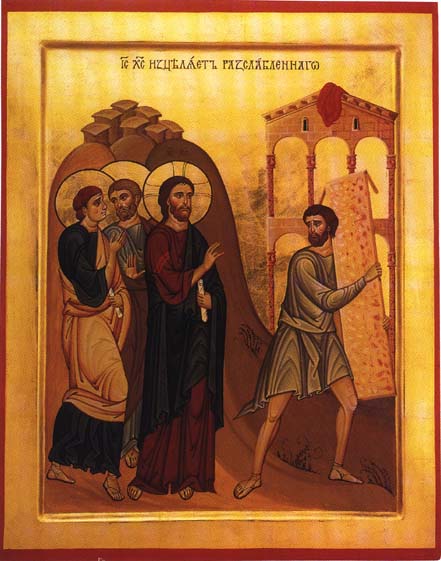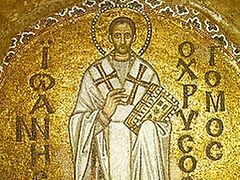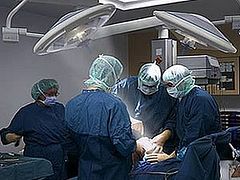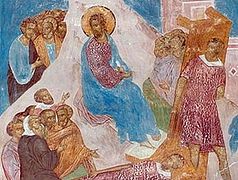
Today is the Fourth Sunday of Pascha, which is known as the Sunday of the Paralytic because of the appointed reading from the Gospel of John which we have just heard. That the Holy Church has appointed this reading for the Fourth Sunday of Pascha is very interesting, because we begin now to hear Gospel lessons which no longer have any obvious and outward connection to the Paschal season. No longer do we commemorate the events surrounding the Lord’s Resurrection, but about encounters which had already come to pass before our Lord Jesus Christ went to His voluntary and saving Passion.
What is the meaning of this? In a general sense we have already been given the answer during the Lenten season, during the celebration of the Liturgy of the Presanctified Gifts: “the light of Christ enlighteneth all.” These prior events in the Lord’s earthly ministry, like everything in the Holy Scriptures and in all of life itself, can only be properly understood in the light of Christ’s Resurrection. And indeed, the Church is showing us that the significance of Pascha is by no means limited to the future only, to the resurrection of all men on the last day. The Church is showing us that Pascha is the only significance of any event, the only meaning of any story, whether in the life of Christ or in all the life of men. As the Apostle says: if Christ be not raised, your faith is vain. Indeed, not our faith only but all the world is nothing if not vanity without the Resurrection of the Lord.
What then is the Paschal significance of this Gospel passage in particular? Blessed Augustine has given the following interpretation. The five porches surrounding the pool are the five Books of Moses, that is, they are the Law. “But,” says the saint, “those books brought forth the sick, not healed them. For the law convicted, not acquitted sinners.” This is the meaning of the multitude of sick folk who lay within; this is the condition of the human race before the coming of Christ. Yet not all the human race: the Jewish people, shut in by the five porches, the Law of Moses, were waiting for the moving of the water which would heal them, but those outside had as yet no chance or hope of ever being healed. Well does the Apostle preach the benefit of the Law, even despite its inability to heal, for it is surely far better and more desirable to know one’s own sickness than to be blind, maimed and paralyzed, and all the while to believe that one is the very picture of health. Our modern world, so desperate to proclaim its own enlightenment and to pride itself in its every vice, would do well to take heed.
But to continue Blessed Augustine’s interpretation of the Gospel passage:
What, then, is meant by this [coming of one unseen to trouble the water], unless it be that there came one, even Christ, to the Jewish people; and by doing great things, by teaching profitable things, troubled sinners, troubled the water by His presence, and roused it towards His own death? But He was hidden that troubled. For had they known Him, they would never have crucified the Lord of glory. Wherefore, to go down into the troubled water means to believe in the Lord’s death.
Here is clearly revealed a prefiguration of the Mystery of Baptism, which is nothing other than a personal and mystical entrance into the Passion and Resurrection of the Lord. And just as Christ’s healing of this one paralytic among the many was given as an earnest for all the rest, so the Holy Church has given us this one miracle taken from the Lord’s ministry as an earnest of all the other miracles, to show us that indeed His miracles and works of healing were in no way arbitrary or unrelated to the great and saving work of His Passion and Resurrection. They were not simply a way to pass the time before the Lord went up to Jerusalem. They were not merely a show of power, performed in order to empirically persuade the people of His divinity.
No indeed: every miracle performed by Christ during His earthly life, and every miracle performed even up until today by His saints, is a self-revelation of the unseen God. Miracles, as the Holy Fathers teach, are given not for the faithful but for the unbelieving. Yet we must be careful to understand what sort of faith it is that miracles are given in order to support. Not mere rational assent, to be sure; if such were the case, miracles would amount to little more than intellectual coercion. No, miracles are performed in order to give true faith, faith in the sense of trust and not of mere belief. Miracles are given so that we can know God, with the knowledge born of experience rather than read in a textbook.
If this is so, then what is the spiritual knowledge which the Church wishes to plant in each of our hearts by means of the Paschal light shining through today’s Gospel reading? Well, after all this is not so complicated. The Scriptures always reveal to us both our own souls on the one hand, and the glory and mercy of God on the other.
We have seen the Lord’s Pascha, the bright and glorious Resurrection. But we see also our own selves. Though the Lord is risen, yet on this earth men still must die. And like the Apostle Thomas, we will sometimes doubt. Like the Myrrh-bearing Women, we will sometimes grieve over the death of Christ within the tomb of our hearts. And like the paralytic in today’s Gospel reading, we will have to wait patiently, perhaps even for a lifetime, enduring the paralysis of our passions.
But Christ is risen. And like Thomas, we will one day behold Him risen from the dead with our own eyes. Like the Myrrh-bearing Women, we will see the stone of our hearts rolled away. And like the paralytic, we will one day hear the voice of Christ bidding us to “arise and walk towards the paths that are straight.” But what we do then is always and irrevocably our own choice. We must still choose to believe, as did Thomas. We must still choose to enter within our hearts, as did the Myrrh-bearers. And we must still choose to actually get up and walk, as did the paralytic. The miracle of God is that we are given the power to do this. Yet it will not be done for us.
Let us pray that the Lord will grant us the faith to bear patiently our spiritual infirmities in the sure knowledge that, though they are present, they have nevertheless been already overcome. Let us rejoice always in the healing that has been granted to us, as men who have received their cure though the medicine’s action might not be instantaneous. And above all, let us together glorify with our whole hearts Christ risen from the dead, trampling down death by death, and upon those in the tombs bestowing life. For it is, in the end, our worship of Him which is itself our resurrection. Amen.




